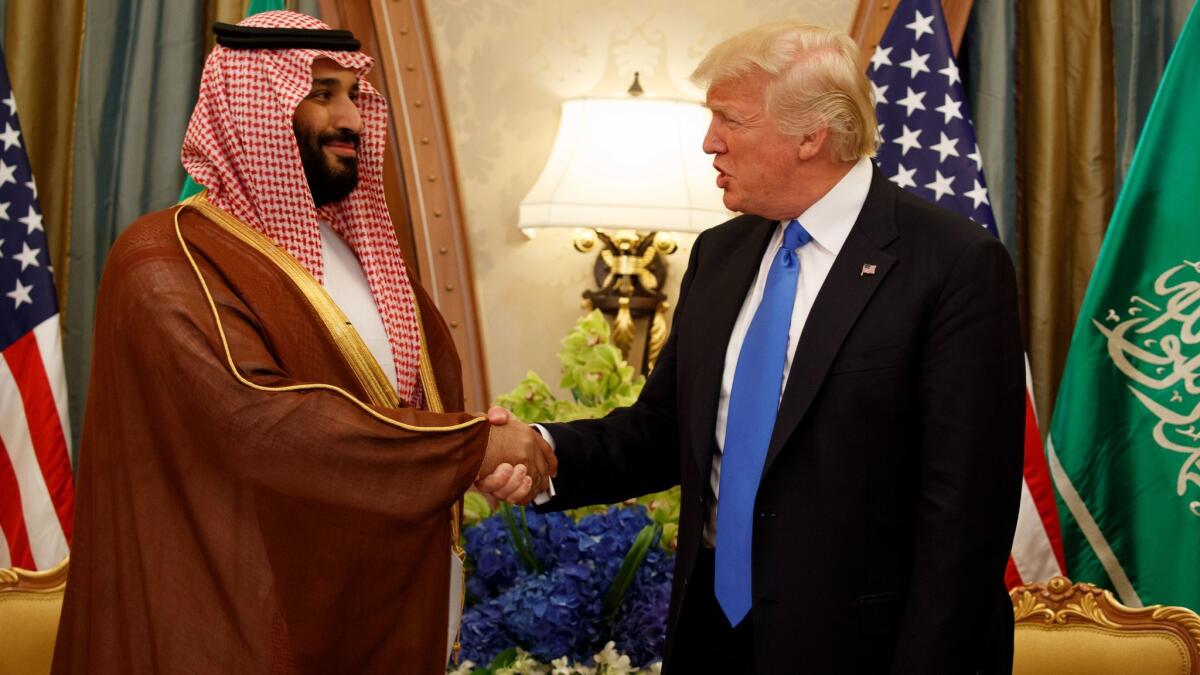Op-Ed: Trump adds the Saudi crown prince to his list of favorite autocrats

- Share via
If there has been one constant in Donald Trump’s first year in office, it is his boundless admiration of, and support for, the world’s autocrats.
He congratulated Recep Tayyip Erdoğan on a referendum consolidating his rule and demolishing the remnants of Turkish democracy. He told Rodrigo Duterte of the Philippines that he was “doing an unbelievable job on the drug problem” by unleashing death squads that have killed thousands. He said that Russia’s Vladimir Putin deserves an “A for leadership.” He praised Egyptian President Abdel Fattah Sisi, who is jailing both liberals and Islamists, as a “fantastic guy.” And after China’s Xi Jinping prolonged his rule indefinitely at the recent Communist Party Congress, Trump congratulated him on his “extraordinary elevation.”
It is therefore no surprise to see Trump cheerleading the young crown prince of Saudi Arabia, Mohammed bin Salman (widely known as MBS), after he arrested an estimated 500 members of the Saudi elite, including at least 11 princes and confined them to the Riyadh Ritz-Carlton — the world’s most opulent prison.
This bold but risky purge came after a secret trip to Saudi Arabia last week by America’s crown prince, Jared Kushner, for meetings with his 32-year-old Saudi counterpart. Speculation that the U.S. had approved the arrests in advance grew when Trump tweeted on Monday: “I have great confidence in King Salman and the Crown Prince of Saudi Arabia, they know exactly what they are doing.... Some of those they are harshly treating have been ‘milking’ their country for years!”
Saudi Arabia’s crown prince has shown that his zeal may outrun his judgment.
“Milking” refers to the public justification for the purge: the fight against corruption. But that’s the same excuse that Xi and Putin use to eliminate their rivals. Like them, Crown Prince Salman’s credentials as a battler for the little guy are suspect. There are, for example, widespread reports that while on vacation in the south of France in 2015, he took a fancy to a yacht owned by a Russian oligarch and bought it on the spot for $550 million. Given the porous lines between state and royal revenues, he was in effect using public funds to buy this extravagant plaything. Such behavior chips away at MBS’ credibility as he cuts state salaries and subsidies, an overdue but painful move necessitated by low oil prices.
The cuts arebut one of many reforms that MBS has undertaken since becoming the kingdom’s second-most powerful man, after his octogenarian father, King Salman. MBS has taken power away from the feared religious police, and he is permitting women to drive and movie theaters to open. He has said his goal is to transform Saudi Arabia from an oil kingdom with medieval laws into a modern state with a diversified economy. MBS wants a “moderate, balanced Islam that is open to the world and to all religions and all traditions and peoples.”
If MBS turns out to be the Saudi equivalent of Turkey’s Mustafa Kemal Ataturk or Iran’s Reza Shah — an absolute ruler who will secularize a retrograde Muslim country — then the U.S. has every reason to support him. But history contains a cautionary lesson: Reza Shah’s son, like him a modernizer, was overthrown in 1979 after alienating the clerical establishment, leading to the rise of an anti-American regime. Likewise, there is a real risk of MBS overreaching, leading to his downfall. If that were to happen, American influence in the kingdom could plummet because of how closely Trump has identified the U.S. with the controversial crown prince.
Already MBS has shown that his zeal may outrun his judgment. His signature initiative is a war that he launched in 2015 in conjunction with the United Arab Emirates against the Iranian-backed Houthis in Yemen. Yet after 30 months of bombing, the Houthis remain as defiant and dangerous as ever. On Saturday, they fired a ballistic missile that was intercepted near Riyadh by a Saudi Patriot missile battery. The Yemen war has become the Saudi Vietnam, with no light at the end of the tunnel.
Nor has MBS had any more success with his boycott of Qatar, ostensibly over its support for Islamic extremism. In truth, Saudi Arabia has long supported Islamic extremists too, and there are more prosaic reasons for the dust-up, including Saudi chafing over the criticism they have received on Qatar’s state-supported satellite channel, Al Jazeera. After being feted by the Saudi royals in May, Trump endorsed their power play against Qatar, but the dispute hasn’t achieved the results Riyadh wants. Instead, it continues to drag on with no end in sight.
Just before the purge, MBS exercised his regional power again. He supported — some say pushed for — the resignation of Lebanon’s prime minister, Saad Hariri, who claimed he quit to protest Iranian domination of his country. The odds of a regional war with Iran are growing, a conflict that could drag in the U.S.
There is, in short, good cause to wonder whether MBS knows what he is doing — and thus, also, if Trump knows what he is doing in backing him. Or has the president let his enthusiasm for autocrats, whom he would dearly love to emulate, get the better of him?
Max Boot, a senior fellow at the Council on Foreign Relations, is a contributing writer to Opinion and author of the forthcoming book, “The Road Not Taken: Edward Lansdale and the American Tragedy in Vietnam.”
Follow the Opinion section on Twitter @latimesopinion and Facebook
More to Read
A cure for the common opinion
Get thought-provoking perspectives with our weekly newsletter.
You may occasionally receive promotional content from the Los Angeles Times.









